|
|
|
Sort Order |
|
|
|
Items / Page
|
|
|
|
|
|
|
| Srl | Item |
| 1 |
ID:
102775
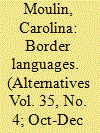

|
|
|
| 2 |
ID:
187068
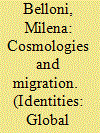

|
|
|
|
|
| Summary/Abstract |
This article argues that the concept of ‘cosmologies of destinations’ is a useful theoretical tool to provide an emic understanding of the social and moral meanings of migrants’ journeys. By this concept, I refer to the hierarchical representations of the world that orient migration journeys. Drawing from my multi-sited ethnography with Eritreans at home and abroad, I illustrate how migration destinations were mapped by my informants along an implicit but widely shared normative and moral scale, with different levels of perceived safety, individual freedom, social recognition and economic achievements. After charting the theoretical field concerning social imaginaries and cultures of migration, I show the importance of symbolic and moral structures for understanding my informants’ mobility choices at different stages of their migration process. I conclude by highlighting the potential of this concept to study the interplay of mobility and immobility, particularly in the framework of increasing constraints
|
|
|
|
|
|
|
|
|
|
|
|
|
|
|
|
| 3 |
ID:
187078
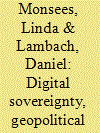

|
|
|
|
|
| Summary/Abstract |
“Digital sovereignty” has emerged as a hot topic in European politics. But although true European digital sovereignty seems unattainable, analysing the digital sovereignty discourse is still useful since it tells us much about European politics. We examine three “projects” which are part of the broader digital sovereignty initiative: 5G, Gaia-X, and the semiconductor industry. This empirical perspective allows for a better understanding of how imaginaries about digital sovereignty play out in these specific tech projects and how these then help to affirm a particular European identity. Methodologically, we focus on how particular geopolitical imaginaries appear in these digital sovereignty projects. Our empirical analysis reveals that Europe’s comparatively weak digital industries are considered a security issue. China and, to a lesser degree, the United States are not only seen as economic rivals but also security threats when it comes to issues such as espionage and data protection. Based on this, we argue that digital sovereignty projects, despite being full of contradictions and tensions, contribute to a distinct EU identity of an agile, future-oriented global player in the digitised economy. This, while not entirely new, is a powerful imaginary even if the proposed idea of “sovereignty” might never be enacted.
|
|
|
|
|
|
|
|
|
|
|
|
|
|
|
|
| 4 |
ID:
190061
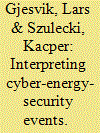

|
|
|
|
|
| Summary/Abstract |
The digitalisation of the energy system brings out the question of cyber threats. How this area is perceived and how cyber-security policy in the energy sector develops is driven by the most spectacular cyber-incidents. How do these events shape public perceptions about the dangers of digitalisation? To understand this, we look at the 2016 CrashOverride cyberattack on Ukraine’s grid. Hypothesising that cyber-energy security incidents are interpreted in the context of socio-technical imaginaries of the energy sector and security imaginaries linked to foreign policy, we distil four discourses that emerged around the Ukraine attack among Western experts and commentators. One represented it as evidence of an accelerating race towards disaster, another as merely a tip of the iceberg. The third portrayed it as less catastrophic than initially suggested, while the last one as part of Russia’s cyber strategy. Not all of these were picked up by the broader public debate in Western security circles, and only the more alarmist discourses had a visible impact beyond niche communities.
|
|
|
|
|
|
|
|
|
|
|
|
|
|
|
|
| 5 |
ID:
152080
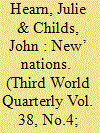

|
|
|
|
|
| Summary/Abstract |
Recently there have been increasing instances of the return of the state as the central agent of development in resource-rich nations globally. Characterised by both a rhetorical and substantive commitment to increasing control over national resource revenues, this so-called new/neo-extractivism has attracted a debate concerning the extent to which it offers a viable alternative to the imperatives of neoliberal resource extraction. Using two examples, this paper analyses the ways in which the Ghanaian and Ecuadorean states discursively imagine such structural transformations. It highlights the value in analysing the politics of language for strengthening studies of neo-extractivism.
|
|
|
|
|
|
|
|
|
|
|
|
|
|
|
|
| 6 |
ID:
142577
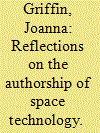

|
|
|
|
|
| Summary/Abstract |
The paper offers a proposition in which the notion of the 'ownership' of outer space is substituted for that of 'authorship'. The notion of authorship draws attention to the processes of critical thinking, re-contextualization and resistances to space technology that take place in social domains where no clear role exists either as audience or user of space technology. The proposition responds in part to interventions made by artists in recent years into the workplaces of space technologists and, incrementally, into the imaginaries that inform the kinds of activities that happen in space. Artistic processes expose the reception of space technology at an intimate scale where the agencies of the viewer to observe, absorb and rethink converge with the shaping of space technology via state mediation and space agency imperatives. The constituency of collective authorship to which space technologies are subject is revealed in unexpected ways through artistic intervention that suggests a reappraisal of some of the terms of reference guiding space policy.
|
|
|
|
|
|
|
|
|
|
|
|
|
|
|
|
| 7 |
ID:
167422
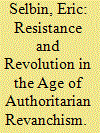

|
|
|
|
|
| Summary/Abstract |
We live in an age of authoritarian revanchism, an era of Austerity-Security States often voted in by a set of fears stoked by elites that economies require patriarchal, conserving policies. Hence the end of state welfare functions, destruction of stable employment and unclear job futures create profound economic fear even as the destruction of communal bonds such as identities, social protections and sense of place have produced deep social dread. Resistance, rebellion and revolution remain ready and apt responses for people all around the world. Recent academic interest in ‘imaginaries’ – social, cultural, technological, psychological and more – reflect a renewed appreciation for human agency, collective action, ideology, cultural matters and the ‘narrative turn’. Rich revolutionary imaginaries, often daring acts of bricolage, provide people with the means and methods to struggle for control of the material and ideological conditions of their everyday lives even in the face of forces inimical to their interests. What could be more meaningful than changing the small worlds that are our everyday worlds and hence matter most for most of us most of the time? Where, when, and who will bring revolution into the 21st Century? A broader, deeper definition will help to ascertain, explore and explicate.
|
|
|
|
|
|
|
|
|
|
|
|
|
|
|
|
| 8 |
ID:
167662
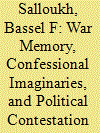

|
|
|
|
|
| Summary/Abstract |
How does sectarianism intersect with war memories to subvert the political balance of power in postwar Lebanon? This article examines this complex dynamic along two levels. On one level, it demonstrates how war memory is deployed selectively from above by members of the political elite to sabotage the national war memory sanctioned officially and corresponding to a particular postwar confessional balance of power. At another level is the confessional or sectarian use of memory to resist this postwar political balance of power perceived as unjustly tipped against the subnational community. The argument advances in two steps. I first examine how war memory is invoked during crucial political battles that impact the postwar confessional balance of power. I take the debate around the promulgation of a new electoral law, and the 2018 parliamentary elections, in the context of the regional repercussions of the explosion of the Islamic State in Iraq and Syria (ISIS) and the spillover effects of the Syrian war on Lebanon, as a case study of how different elites not only invoke war memories to contest or defend the postwar confessional balance of power but also to advance intra-sectarian political prerogatives. I then consider political memory as part of a complex and variegated confessional imaginary that survives at the private level in the form of resistance by substantial sectors of the Christian community to the postwar political balance of power and to the official national narrative of the war, one that refuses to revisit some of its most sordid moments, namely, its massacres. The article closes by underscoring the importance of reconciling dissonant memories of the war as a prerequisite for achieving genuine justice, peace, and reconciliation in postwar Lebanon.
|
|
|
|
|
|
|
|
|
|
|
|
|
|
|
|
|
|
|
|
|